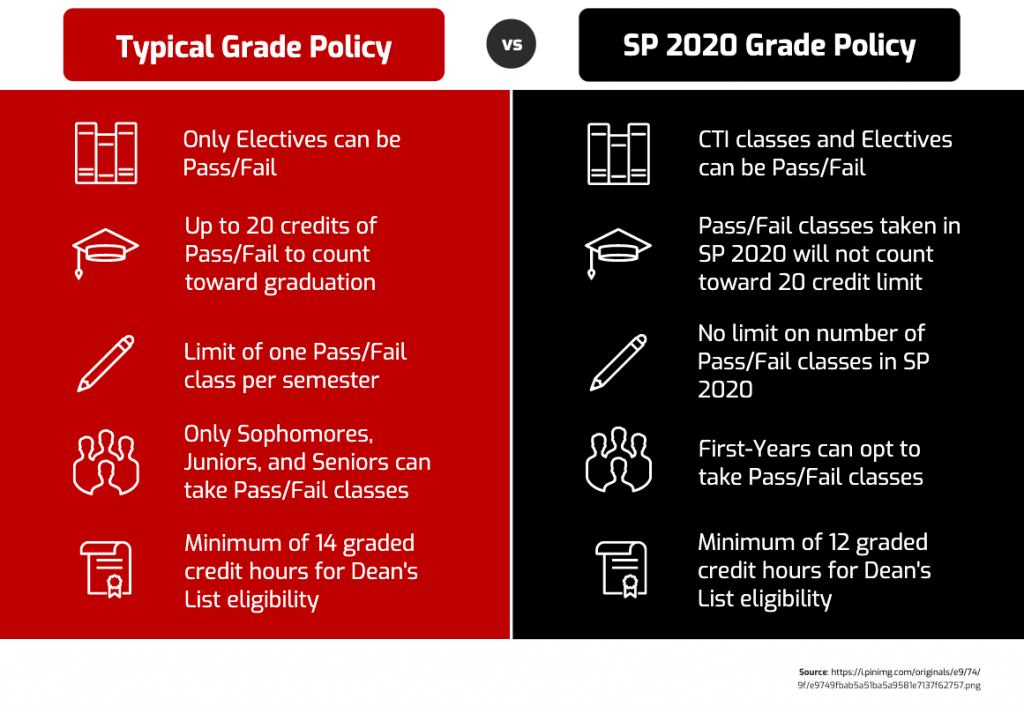
On April 6, William Jewell College adopted a new pass/fail policy for the rest of the semester during a special faculty meeting. Faculty and Student Senate leaders debated together to come to this decision.
The spring 2020 grade policy allows students to choose to take Critical Thought and Inquiry (CTI) courses and electives for pass/fail credit. Students are usually able to take only elective courses for pass/fail credit. Students taking language classes taken for CTI credit can opt to take the courses as pass/fail.
Normally, students could only take one pass/fail per semester, but this restriction has been removed. Students usually have to limit their total number of pass/fail credits to 20 credits, but courses taken pass/fail this semester will not count towards these 20 credits. First-years can take classes pass/fail in the spring 2020 semester – normally they are not allowed to take pass/fail classes.
The minimum number of graded credits to be considered for the Dean’s List has been reduced from 14 to 12 credits for the spring 2020 semester.
Several aspects of the grade policy remained the same. The minimum passing grade for CTI and elective classes is a D-, which was kept the same. Once a student chooses to take a class pass/fail, the professor will not know but will submit a final grade as usual, and then the registrar will look at this grade and put either a “pass” or “fail” into the student’s record.

Dr. Gary Armstrong, professor of political science, was one of the faculty members involved in the decision-making process.
“In the grip of a public health emergency and economic emergency, Jewell faculty came to believe that students were facing extraordinary stress or could be facing extraordinary stress in very unusual circumstances,” said Armstrong in an explanation of why the policy was changed.
Armstrong stressed that the faculty realized some students may be in complicated situations away from school. This pass/fail option allows students to relieve stress during this time and lets students prioritize academic efforts so students could focus more on classes for their major and less on electives and/or CTI classes, if they so choose.
Hannah Keeney, 2019-2020 Student Senate president and senior psychological science and Applied Critical Thought and Inquiry major, commented on the Student Senate perspective.
“Regarding the pass/fail proposal and later policy for the Spring ’20 semester, I supported it through and through. I believe the intention was to relieve some stress by allowing students to opt for pass/fail in their elective courses,” said Keeney.
Another important topic discussed was that, obviously, students and faculty did not know that half of this semester would be online when they signed up for classes. Therefore, this pass/fail policy does not extend to summer classes – as students know whether their classes will be online or not when they sign up for them.
Many alternative plans were discussed and faculty looked at what different schools were doing – including mandatory pass/fail in all classes, pass/fail in any class the student chose and pass/fail only in core and elective classes. Armstrong relayed that, at first, many faculty members were in favor of mandatory pass/fail in core curriculum classes.
Armstrong expressed that some programs were concerned about pass/fail for major classes. The accounting faculty were concerned because some states don’t allow pass/fail classes to count for the number of required credits needed to take the Certified Public Accountant exam. Although many states are altering these requirements during this unprecedented time, he said it is hard to know what to tell students. The nursing program also was concerned about moving to pass/fail for all classes.
Because of these concerns, the faculty were able to come to a consensus that allowing students to choose pass/fail on CTI and elective classes only was the best option.
Regarding feedback after the policy went into effect April 6, 23 students had elected to take a class pass/fail as of April 28. Armstrong expressed that that number was much lower than the faculty expected, but the deadline to declare pass/fail was not until May 1. He wondered if the low number indicated that students were in a much better place than faculty had anticipated.
Students have reacted differently to the pass/fail policy change – some express desire for the chance to have more options about pass/fail in major and minor courses and some prefer sticking with graded courses.
“I’m motivated by A’s, so I’d do the bare minimum in a pass/fail class,” said Charlene Noble, sophomore psychological science and elementary education major.
“I would have considered pass/fail if it could be applied to my major or minor, but since it didn’t, I chose not to take any classes pass/fail,” said Jenna Hultgren, sophomore English major.
